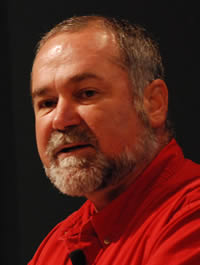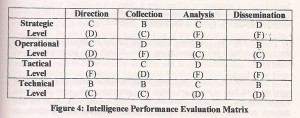
Taking the Helm of a Rudderless Agency Also Lacking an Engine
The Public Intelligence Blog (Phi Beta) has published a report on a speech delivered by Lt. General Michael Flynn (U.S.A.) the newly appointed Director of the Defense Intelligence Agency (DIA) in September 2012. The speech was delivered to an audience at Fort Huachuca, Arizona, which is the location for the U.S. Army Intelligence Command and Network Enterprise Technology Command (NETCOM). The speech was obviously written by General Flynn’s staff and was largely window dressing. Yet General Flynn like many of his predecessor DIA Directors is a smart and dedicated officer who wishes to establish some meaning and purpose to what has long been called “the redundant agency.”
Well I believe that the odds are against General Flynn making any real changes at DIA. It must be remembered that DIA was created by Defense Secretary Robert McNamara to fuse intelligence reporting by the military intelligence commands into single, integrated intelligence products. This idea failed because of fierce and persistent resistance by the individual military service chiefs and because of Secretary McNamara’s lack of management skill. So almost from the first DIA was an agency adrift without any dedicated advocate either in DOD or the congress. Also unique among the big four intelligence agencies, DIA really doesn’t have any dedicated collection resources saving for its Defense Attaché’ System in which it is dependent on military officers over which it really has very little control. Lacking any dedicated DIA collection mission the agency is those early years was reduced to getting handouts from military intelligence agencies and the National Security Agency. CIA in general shared little with DIA during the first thirty years of DIA’s existence. The new Defense Clandestine Service supposedly will remedy this to some extent, but the jury is still out on this new service [Phi Beta Iota: and at the same time, both the Department of Homeland Security and the US Special Operations Command are creating their own Human Intelligence (HUMINT) and Counter-Intelligence (CI) programs, relying on out-sourcing to contractors, and completely oblivious to what is now called “full-spectrum HUMINT,” something DIA is ideally suited to develop but only if it first lays waste to the entrenched civilians and ticket-punching military free riders.]
There are also DIA’s unique human resources problems. Because the majority of DIA senior management are military there is a constant churn as officers come and go in the course of normal tours of duty. Also many of these officers have not followed an intelligence career path so are rather poorly informed on intelligence operations. Also DIA was, and presumably still is, a magnet for military intelligence officers because a tour with DIA, especially its current intelligence shop counted as a “Joint Tour” which was a mandatory box that had to be checked for officers to have any hope of promotion to field grade ( 04, 05, 06 pay levels). As a result DIA offices are generally awash with junior officers who form the backbone the military intelligence analyst corps, but who vary widely in ability and motivation. And of course like their superiors these officers are also transitory.
The human resources problems also extend to the DIA civilian work force. DIA’s civilian analytic work force, like their military counterparts, vary wildly in ability and motivation. Because DIA follows the Federal Civil Service to be promoted a DIA civilian must apply for a position that has the grade to which he/she wishes to be promoted. Since DIA fills so many senior positions with military officers the number of such positions for civilians is relatively limited. As a result DIA loses large numbers of highly qualified civilian intelligence analysts each year. Indeed the best analysts often use DIA as a sort of half way house on their way to academic or think tank careers. DIA gives them a chance to pick up those all important security clearance and perhaps an advanced area studies degree and away they go.
The institutional culture of DIA has been characterized in the past by over compartmentalization, over deference to military rank over actual intelligence experience and knowledge, and an apparent inability to develop a real strategic intelligence program that would guide DIA operations in the 21st Century. Further DIA has extremely poor technical leadership which is manifested in two ways: 1) DIA enterprise architecture, including IT infrastructures is probably the worst in the IC; and 2) leadership at the analyst working level is at best haphazard, yet it is at this level that intelligence work actually gets accomplished.
So is General Flynn going to be the Director who turns DIA around and establishes a real mission for the agency? Well maybe, but previous experience would seem to make it unlikely. As General Flynn will no doubt discover, the only job worse than being Director of DIA is being Director of National Intelligence.

ROBERT STEELE: In theory DIA has Measurements & Signatures Intelligence (MASINT) and in theory DIA should have privileged access to National Security Agency (NSA) and National Geospatial (Intelligence) Agency (NGA) capabilities but in reality DIA is considered the intellectual runt of the entire litter, held in slight regard by the services, largely ignored by the other agencies, and generally dismissed by the theater intelligence centers even thought the Director of DIA (D/DIA) is also the owner of the General Defense Intelligence Program (GDIP). Put bluntly, DIA has little to offer anyone in the way of value-added collection, processing, or analysis. DIA has been further diminished by the creation of the Undersecretary of Defense for Intelligence (USD (I), an office and expense that would be much more useful if it were shut down, renamed the Undersecretary of Defense for Peace, and restaffed to focus on waging peace through stabilization & reconstruction operations as well as support to Whole of Government and M4IS2 operations. In combination with the very poorly conceived “centralization” (or looting) of operational intelligence resources that diminished organic multi-source capabilities among the services while creating new useless bureaucracies at the theater level (too many Colonels, not much in the way of serious collection managers and all-source analysts), the well-intentioned ambitions of Dwayne Andrews, Marty Hurwitz, and Jim Clapper all converged into a perfect storm that destroyed military intelligence at the same time that civilian intelligence was hitting bottom. The below “grades” appear on page 33 of Robert Steele, ON INTELLIGENCE: Spies and Secrecy in an Open World (AFCEA, OSS, 2000), a book that was written with aid from very knowledgeable senior officers recently retired at the time . Little has changed since the book was published except for scale–the amount of money that continues to be spent on doing the wrong things is now over $80 billion a year and probably, counting black and off the books “intelligence,” closer to $150 billion. The present situation – a Director of National Intelligence (DNI), USD (I), and the complete absence of serious decision-support for policy, acquisition, and operations — not just lacking within DoD, but across the entire spectrum of Whole of Government – represents the end of an era…..the end state of doing the wrong things righter, at ever greater expense, with ever greater moral and intellectual corruption. The third era of national intelligence, the era of The Smart Nation, is beginning. It will be characterized by a virtual integration of education, intelligence, and research, and by the maturing of both intelligence and Information Operations (IO) toward M4IS2. At this point it is much more likely that Brazil or China or India will do this right, rather than the USA.

“The righter we do the wrong thing, the wronger we become. When we make a mistake doing the wrong thing and correct it, we become wronger. When we make a mistake doing the right thing and correct it, we become righter. Therefore, it is better to do the right thing wrong than the wrong thing right. This is very significant because almost every problem confronting our society is a result of the fact that our public policy makers are doing the wrong things and are trying to do them righter.” (Russell Ackoff 2004)

RICHARD WRIGHT: Good comments. Here is some amplification on what you wrote: you are correct, DIA has responsibility for producing Measurements and Signatures Intelligence (MASINT). The problem is that MASINT is like Electronic Intelligence (ELINT) that the NSA held responsibility for; with the end of the Cold War interest in both have faded rather quickly. Just as changes in telecommunication technology and methodology have made the art and science of “signals analysis” OBE. [Robert Steele: this means General Flynn should be stripping MASINT resources and using them to pay for innovation elsewhere.]
The NSA has always provided DIA with full access to NSA product reporting, but many DIA analysts lacked the minimal technical skills necessary to access these products. Indeed during my tour with DIA, much of my time was taken up either retrieving NSA products for my DIA partner analysts or giving them tutorials in how to effectively use the NSA product report data base. I also spent time showing them how information from NSA products could be woven into their assessments and “Daily Intelligence Notes (DIN)” publications. At one point several of my DIA colleagues approached me with the proposals that I should either transfer to DIA or that DIA should absorb NSA. As for IMINT of course when I was at DIA, CIA still maintained a monopoly on Imagery Analysis through their National Photo Interpretation Center (NPIC) and were reluctant to share with anyone save a small circle non-CIA analysts. NGA actually has worked closely with DIA and very closely with NSA, but again the lack of technical competence at DIA prevents that agency from working as closely with NGA as they should.
The position of Under Secretary for Defense for Intelligence, like DNI and DHS is a matter of bureaucratic politics not sound intelligence.
See Also:
1991 Plan for Restructuring Defense Intelligence
2012 50 Years of Excellence in Defense of the Nation
James Carroll,* House of War: The Pentagon and the Disastrous Rise of American Power (Mariner Books, 2007)
* son of General Carroll, the first Director of the Defense Intelligence Agency, a former FBI special agent who entered the military with the rank of brigadier general with the mandate to create the Office of Special Investigations for the U.S. Air Force.
Mini-Me: General Mike Flynn on Intelligence — Earnest Advance or Better Kool-Aid? [with many linked references]
Search: “new rules for the new craft of intelligence”



